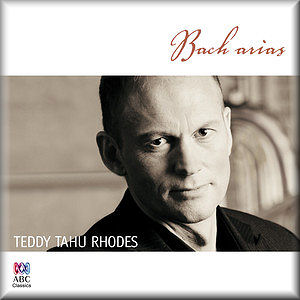 |
 |
|


alternatively
CD: MDT
AmazonUK
AmazonUS |
Johann Sebastian BACH
(1685-1750)
Arias from Cantatas and Oratorios
Doch weichet, ihr tollen vergeblichen Sorgen from Cantata BWV8 [5:07]
Herr, so willt from Cantata BWV73 [3:32]
Wohlzutun und mitzuteilen from Cantata BWV39 [2:51]
Mein Freund ist mein from Cantata BWV140 [5:45]
Der ewig reiche Gott from Cantata BWV192 [2:53]
Mache dich, mein Herze, rein from the St. Matthew Passion, BWV244
[6:16]
Gebt mir meinen Jesum wieder from the St. Matthew Passion, BWV244
[2:55]
Cantata BWV82 ‘Ich habe genug’ [22:44]
Bist du bei mir (attr. Gottfried Heinrich Stölzel, arr. Jessica
Wells) BWV508 [2:37]
 Teddy Tahu Rhodes (bass-baritone); Sara Macliver (soprano)
Teddy Tahu Rhodes (bass-baritone); Sara Macliver (soprano)
Orchestra of the Antipodes/Anthony Walker; Brett Weymark
rec. 24 March 2003, 15-17 December 2005, 12 December 2006 and 17-18
November 2008, Eugene Goossens Hall of the Australian Broadcasting
Corporation’s Ultimo Center, Sydney.
 ABC CLASSICS 476 3871 [55:15] ABC CLASSICS 476 3871 [55:15] 
|
|
|
That death, and the promise of a better life thereafter are
central themes in Bach’s sacred output is no surprise.
It would be a century before Pasteur’s connection between
bacteria and disease would revolutionize medicine and sanitation
practices. Effective pain-killers were practically non-existent
and people died with a regularity that would be unimaginable
in the modern world. Thus, people turned to charms, rituals
and most importantly, religion to find comfort and cure.
Sebastian Bach created an enormous amount of music to be used
in the four Lutheran churches in Leipzig, principally, St. Thomas
Church. Over a span of fifteen years, Bach composed at least
one cantata a month of which some 250 are extant. In addition
to the cantatas, there is the tremendous output for organ, four
passions (two are extant), Lutheran masses, the Christmas Oratorio
and The Mass in b minor.
In dramatic music, the voice of wisdom, age and authority or
in some cases malice is most often given to lower voices. In
opera bass singers are cast as fathers, villains, judges, or
elders in general, while tenors get to be the heroes and young
lovers. In the sacred realm, it is traditional to give Jesus
a bass voice to assert his authority, and to provide a sense
of comfort. Teddy Tahu Rhodes has chosen a program of arias
that centers on the themes of hope, exhortation, comfort and
the acceptance of death. He is joined by Sara Macliver for two
fetching duets cast as dialogues between Christ and the faithful
soul.
The centerpiece of this recital is the dramatic solo cantata
‘Ich habe genug’ spoken from the point of
view of a man at the end of his life, giving the summation of
his earthly journey and preparing for a new life to come. Its
poignant opening movement is really a resignation from life.
A confession that there is nothing left on earth left to live
for and a plea for the release of death. The stunning second
movement, Schlummert ein is a lullaby to oneself and
is one of the most beautiful melodies in the Bach canon. Such
is the dramatic impact of this monumental work, that the innovative
and controversial director Peter Sellars created a striking
staging of the work for mezzo-soprano Lorraine Hunt Lieberson,
who performed the work as a dying patient clad in a hospital
gown and confined to her bed connected to tubes and machines.
Ironically it would be just a short time from these performances
before Ms. Hunt Lieberson would succumb to cancer. Many believed
this performance to be her musical will and testament.
Mr. Rhodes is a most expressive singer, whose deep bass hues
are combined with the clarity and slight edge of the higher
baritone register to result in a voice of both total authority
and remarkable beauty. His ability to plumb the lowest notes
of his register is balanced by a complete ease in the upper
range. His is the perfect voice for Bach, who was seldom forgiving
to singers, making demands on the voice that require complete
control and a virtuoso technique. It is no wonder that Bach
often complained that his music was seldom performed to his
standards. Those standards are often well beyond even trained
professional singers.
Other highlights include the beautiful dialogue duet Mein
Freund ist mein, with its text from the Song of Songs. Mr.
Rhodes is joined by soprano Sara Macliver, whose dulcet soprano
is a fine match for Rhodes richly colored voice.
The Orchestra of the Antipodes, under two different batons,
is a sensitive band, with a sweet and finely tuned string section
and ample ability within its ranks to handle Bach’s often
challenging obbligato parts. Many of Bach’s arias are
effectively duets between the singer and a solo instrument,
and none of the instrumental soloists here disappoint.
Excellent notes are provided by K.P. Kemp and complete texts
and translations are included. ABC Classics is a new label to
me, but it is obvious that the engineers at the Australian Broadcasting
Corporation have their skills well in hand, giving us a recording
that is as warm as it is present, as clear as it is reverberant.
Kevin Sutton
|
|




 All Nimbus reviews
All Nimbus reviews








